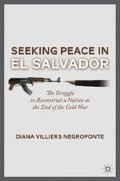Abstract
Despite protestations from the leadership of the Frente Farabundo Marti de Liberación Nacional (FMLN) that the decade-long civil war in El Salvador was an internal struggle with only external ramifications,1 both the Salvadoran government and the FMLN and its partner, the Frente Democrática Revolucionario (FDR) recognized that U.S. support for the former, as well as Cuban and Soviet support for the latter played significant roles in the generation and, later, the ending of that conflict. Salvador Samayoa, the leader of the FMLN’s comisión negociadora (diplomatic and political commission) emphasized the internal nature of Salvador’s conflict, but he was also cognizant of the Cold War’s impact on Latin America. In Samayoa’s opinion, El Salvador had become a pawn in the geopolitical contest between the superpowers. “Los Estados Unidos estaban viendo a América Latina como una pieza del ajedrez geopolitico en su confrontación global con la Unión Soviética …”2 (The United States was viewing Latin America as a geopolitical pawn in its global confrontation with the Soviet Union.)
Access this chapter
Tax calculation will be finalised at checkout
Purchases are for personal use only
Preview
Unable to display preview. Download preview PDF.
Notes
H. Michael Erisman, Cuba’s Foreign Relations in a Post-Soviet World (Gainesville: University Press of Florida, 2000), p. 170.
Jan S. Adams, A Foreign Policy in Transition; Moscow’s Retreat from Central America and the Caribbean, 1985–1992 (Durham: Duke University Press, 1992), p. 139.
Yuri Pavlov, Soviet Cuban Alliance: 1959–1991 (Miami: North-South Center Press, University of Miami, 1996), p. 144.
Gabriel Szekely “Forging a North American Economy: Issues for Mexico in the 1990s” Mexico’s External Relations in the 1990s, ed. Riordan Roett (Boulder, CO.: Lynne Rienner Pub. 1991).
Copyright information
© 2012 Diana Villiers Negroponte
About this chapter
Cite this chapter
Negroponte, D.V. (2012). External Influences on the Negotiations to End the War in El Salvador. In: Seeking Peace in El Salvador. Palgrave Macmillan, New York. https://doi.org/10.1057/9781137012081_6
Download citation
DOI: https://doi.org/10.1057/9781137012081_6
Publisher Name: Palgrave Macmillan, New York
Print ISBN: 978-1-349-29909-6
Online ISBN: 978-1-137-01208-1
eBook Packages: Palgrave Political & Intern. Studies CollectionPolitical Science and International Studies (R0)

